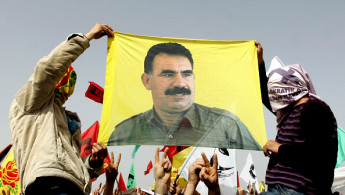Turkish TV editor avoids long jail term over Abdullah Ocalan comments
A Turkish opposition TV channel editor on Wednesday walked free after being convicted in a high-profile trial over his on-air comments about jailed Kurdish insurgency leader Abdullah Ocalan.
Tele1 chief Merdan Yanardag could have been sentenced to more than 10 years in prison for spreading "terrorist propaganda" and "praising criminals" during one of his programmes in June.
An Istanbul court sentenced the 64-year-old to two-a-half-years in prison after finding him guilty of the propaganda charge.
But it also allowed him to walk free because Turkish jail sentences of less than three are rarely enforced.
#Sondakika | Merdan Yanardağ hakkında verilen tahliye kararı mahkeme salonu önünde böyle karşılandıhttps://t.co/eHji8YwExP
— Cumhuriyet (@cumhuriyetgzt) October 4, 2023
"I was arrested because of comments I made in a programme," Turkish media quoted Yanardag as telling the court.
"The only thing I did in the programme was criticise (ruling party) policies."
Yanardag's supporters say his detention and trial highlights the erosion of civil liberties and media freedoms during two decades of President Recep Tayyip Erdogan's conservative rule.
But they also underscored the deep fissures in Turkish society about its treatment of the long-repressed Kurdish minority.
Yanardag questioned why Ocalan - who headed an insurgency waged by the outlawed Kurdistan Workers' Party (PKK) until his capture by Turkish forces in 1999 - was still being held in solitary confinement on a prison island in the Sea of Marmara.
"If normal incarceration procedures were applied, he should have been released or put under house arrest," he said in June.
"The isolation applied to Ocalan has no place in law. It should be lifted.
"Abdullah Ocalan is not someone to be taken lightly," Yanardag added. "He is a very intelligent person who understands politics well."
Yanardag argued that his comments had been deliberately taken out of context and spread on social media by members of Erdogan's AKP party and other staunch nationalists.
Tele1 said Yanardag was actually criticising a proposal by AKP lawmakers to restart a 2013-15 peace process with Kurdish insurgency leaders.
A deep economic crisis and a devastating earthquake earlier this year largely failed to siphon voters to the opposition.
— The New Arab (@The_NewArab) June 2, 2023
As Erdogan stays in power, what's next for Turkey's opposition? 👇
✍ @YleniaGostoli https://t.co/oKWx7JxGSK
The PKK is proscribed as a terrorist organisation by Turkey and its Western allies for waging a four-decade rebellion that has claimed tens of thousands of lives.
Erdogan initially viewed the talks as a chance to both end the violence and find a lasting solution that involved giving Kurds broader cultural rights in Turkey's southeast.
He pulled out of them after the July 2015 assassination of two police officers that were claimed - and then renounced - by the PKK.
Turkey soon resumed military operations against Kurdish groups that have since stretched into northern Iraq and parts of Syria.
The Tele1 debate over Ocalan started shortly after Erdogan defeated secular opposition leader Kemal Kilicdaroglu in a May presidential election runoff.
Kilicdaroglu had initially courted Kurdish groups.
But he turned sharply against them after the first round in a bid to erode Erdogan's nationalist base of support.
Erdogan's AKP is now trying to win over Kurdish voters ahead of March municipal elections, which could end the opposition's control of prized cities such as Istanbul and Ankara.
Yanardag appeared to be trying to point out the contradictions in the AKP's approach to Ocalan and the Kurdish cause.
"You are holding him hostage and conduct negotiations with him," Yanardag said in the June programme.




 Follow the Middle East's top stories in English at The New Arab on Google News
Follow the Middle East's top stories in English at The New Arab on Google News

![A group of Palestinians, foreign and Israeli activists gather to participated in an olive picking event on the land in the town of Battir, which is under threat of confiscation by Israel in Bethlehem, occupied West Bank on 8 November 2024. [Getty]](/sites/default/files/styles/image_330x185/public/2182930803.jpeg?h=199d8c1f&itok=__0LgGsa)
